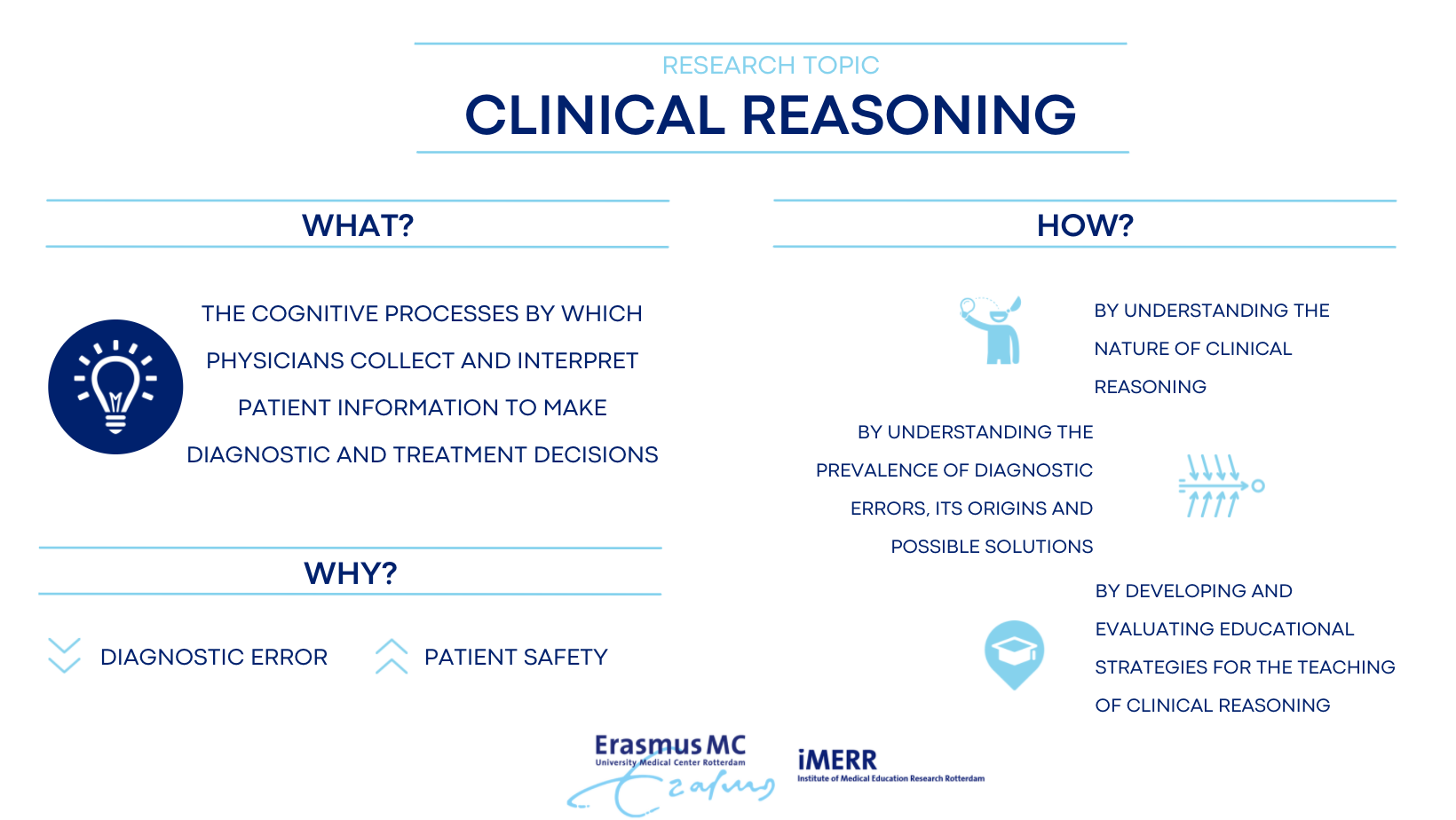
Why clinical reasoning?
One of the most important goals of medical education is to help students become able to effectively diagnose and manage patient problems. This ability depends critically on clinical reasoning, the cognitive processes by which physicians collect and interpret patient information to make diagnostic and treatment decisions. Because the quality of patient care relies on physicians’ clinical reasoning skills, mastering such skills has been much valued at every level of medical education. As concerns with diagnostic error and patient safety increase, the importance attributed to the development of clinical reasoning has grown even further. Studies of real-life diagnostic errors have demonstrated that faults in physicians’ reasoning have played a role in most of the cases. This has stimulated interest in understanding the nature of clinical reasoning, how it operates, what can go wrong and how errors can be prevented. It has also nurtured efforts to investigate how clinical reasoning develops throughout education and what teaching approaches medical schools should apply to help medical students and residents acquire appropriate clinical reasoning skills.
What do we investigate?
These are fascinating issues that have challenged researchers. At iMERR we address these challenges by conducting research on the full spectrum of the clinical reasoning field. Our research ranges from theory building fundamental research around the nature of clinical reasoning till applied research on solutions to improve clinical reasoning in clinical practice and education. In each of the following themes we have several (PhD) projects:
Understanding the nature of clinical reasoning
We study the different modes of (intuitive vs reflective) clinical reasoning by using well-established methods from cognitive psychology research, e.g. eye-tracking, and novel research tools, such as functional near-infrared spectroscopy (fNIRS). We aim to understand how these reasoning modes develop throughout education and practice and how they relate to diagnostic performance. We study the effects of physician-related factors (e.g. expertise level), patient-related factors (e.g., patients’ behaviour) and contextual factors (e.g. time pressure) on diagnostic reasoning and diagnostic performance.
Understanding the magnitude of the problem of diagnostic errors, its origins and possible solutions
We aim to identify the prevalence of actual diagnostic errors (e.g. by reviewing liability claims and patient records) to understand the magnitude of the problem, including the diseases and circumstances at high risk for diagnostic errors. We use simulated clinical cases in experimental research to understand causes of diagnostic errors and develop and test approaches to reduce the likelihood of diagnostic error. Examples are studies of conditions that tend to induce cognitive bias in clinical reasoning (e.g. salient distracting features, recent clinical experiences), factors that influence physicians’ susceptibility to bias (e.g. features of mental representations of disease knowledge and the testing of on-the-spot approaches to improve the reasoning process (e.g. deliberate reflection).
Development and testing of educational strategies for the teaching of clinical reasoning
We conduct experimental studies on instructional approaches (e.g. self-explanation, deliberate reflection) to improve physicians’ and medical students’ clinical reasoning, including studies of educational interventions to reduce physicians’ susceptibility to bias in reasoning. Furthermore, we aim to identify the most effective clinical cases that could be used in clinical reasoning education (e.g. malpractice claims cases).
Collaboration
Our research is conducted in collaboration with colleagues from Erasmus MC and the Department of Psychology, Erasmus University. A strong network of collaboration with researchers and stakeholders from (inter)national universities and organizations around the world (e.g. AUMC, Amsterdam; VvAA liability insurer; University of Bern, Switzerland; Nanyang Technological University, Singapore; Baylor College of Medicine, US; McMaster University and Sherbrooke University, Canada; Federal University of Minas Gerais and UNICAMP, Brazil, University of Minnesota, US). These collaborations have created conditions to conduct many of our projects as joint studies in different countries. For more information about the projects conducted by the iMERR clinical reasoning researchers, please consult the researchers' personal pages below.
Meet the researchers
